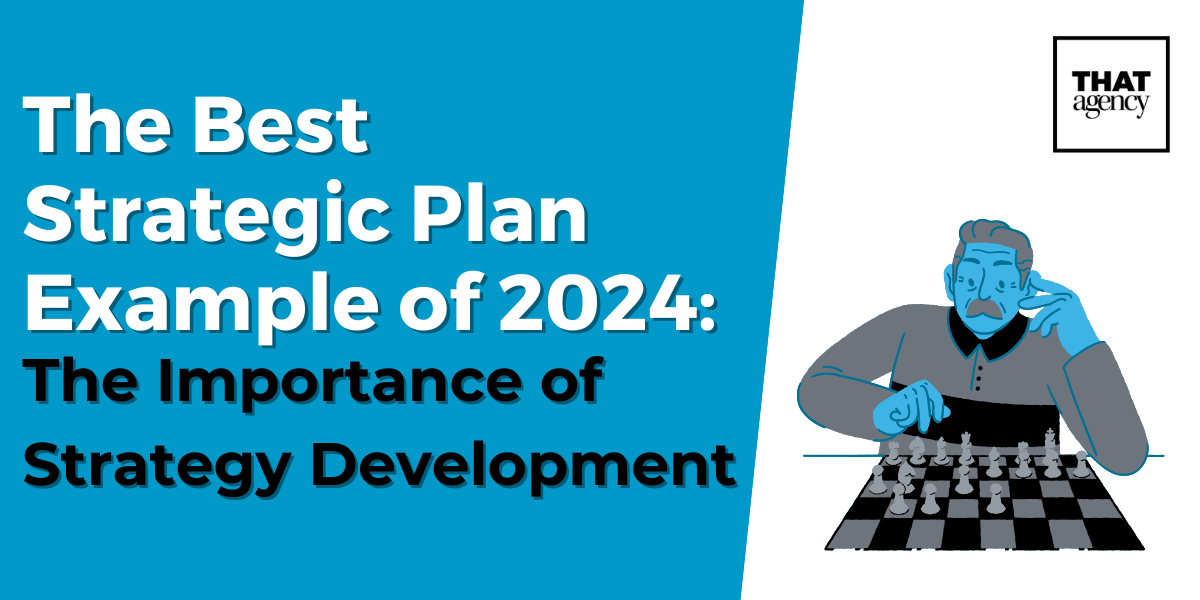In an era where digital landscapes shift with the blink of an eye, developing a cogent strategic plan isn't just an option—it's an imperative. For businesses eager to carve out their niche or cement their standing in a bustling digital marketplace, understanding and implementing a strategic plan example can be the game-changer. From the onset of 2024, we've seen companies that harness the power of strategy development not only adapt but thrive amidst competitive and technological upheavals. In this blog, we delve deep into a strategic plan example and emphasize the critical importance of strategy development across various business models.

What is an example of a strategic plan?
A strategic plan can vary widely depending on the organization's goals, the industry it operates in, and its market conditions. However, a common example can be seen in a mid-sized tech company aiming to expand its market share over the next three years. This strategic plan might include:
- Objective: Increase market share by 15% through expansion into Asian markets.
- Strategies: Develop localized versions of their product offerings to cater to Asian markets, implement a targeted marketing campaign focusing on these regions, and establish strategic partnerships with local firms.
- Actions: Hire regional experts, initiate language and cultural adaptation processes for products, launch pilot marketing campaigns in select cities, and begin negotiation talks with potential partners.
- Performance Measures: Track progress through quarterly sales figures, market penetration rates, and partnership efficacy.
- Review and Adaptation Mechanisms: Annual reviews of market strategy effectiveness with adjustments based on evolving market conditions and internal feedback.
How do you write a strategic plan?
Writing a strategic plan involves several key steps that ensure the plan is comprehensive and actionable:
- Set a clear vision and mission: Understand and articulate what your organization wants to achieve in the long term (vision) and the core purpose of your organization (mission).
- Conduct a situation analysis: Perform a SWOT analysis (Strengths, Weaknesses, Opportunities, Threats) to understand internal capabilities and external market conditions.
- Define strategic objectives: Set specific, measurable, achievable, relevant, and time-bound (SMART) objectives that align with your vision and mission.
- Develop strategies and tactics: Outline the approaches and actions needed to achieve these objectives. This may involve deciding on market entry strategies, product development, and other operational tactics.
- Allocate resources: Determine the budget, personnel, and other resources required to implement the strategies.
- Implement the plan: Execute the strategies and actions as planned, involving all relevant stakeholders.
- Monitor and evaluate: Set up key performance indicators (KPIs) and regular review cycles to assess progress and make necessary adjustments to the strategy.
What are the 7 elements of a strategic plan?
The seven elements of a strategic plan build on the core components by adding layers of depth to ensure thorough preparation and implementation:
- Vision Statement: Articulates a future state that the organization aspires to reach.
- Mission Statement: Describes the organization's purpose and primary objectives to all stakeholders.
- Core Values: Defines the beliefs and principles that guide the organization's culture and decision-making.
- SWOT Analysis: Assesses internal and external factors that could impact the strategy's effectiveness.
- Strategic Objectives: High-level priorities set by the organization to drive progress toward its vision.
- Tactics and Action Plans: Detailed steps and initiatives required to achieve the strategic objectives.
- Performance Evaluation: Tools and methods to assess the effectiveness of the strategic plan and the progress toward meeting strategic goals.
These elements together create a robust framework that guides an organization from planning through execution and evaluation, adapting as necessary to achieve its long-term goals.

What is Strategy Development?
Before we explore the prime strategic plan example of 2024, let’s clarify what strategy development entails. Strategy development involves crafting long-term action plans that align with the overall objectives and resources of a company. It serves as a roadmap that guides decision-making and resource allocation to enhance competitiveness, efficiency, and effectiveness in a market.
Why Is Strategy Development Essential?
Every business, regardless of size—from small local startups to giant e-commerce platforms—needs a robust strategy to navigate the complexities of today’s digital economy. Strategic planning helps businesses:
- Identify strengths and weaknesses: Understanding what works and what doesn’t allows for more informed decision-making.
- Forecast future trends: Staying ahead of industry shifts keeps businesses competitive.
- Allocate resources efficiently: Channeling efforts and investments where they are most needed to maximize returns.
- Enhance decision-making: With a clear plan, every decision supports overarching business goals.

Strategic Plan Example of 2024: A Closer Look
In 2024, one standout strategic plan example comes from a leading e-commerce company that decided to revamp its online presence to boost user engagement and sales. The company’s strategy development process involved several key steps:
- Market Analysis: Comprehensive research on current trends, customer behavior, and competitive landscape.
- Goal Setting: Specific, measurable, achievable, relevant, and time-bound (SMART) goals were established.
- Strategy Formulation: Develop strategies to reach new markets, enhance user experience, and increase operational efficiency.
- Implementation: Rolling out technology upgrades, marketing campaigns, and new user interface designs.
- Monitoring and Evaluation: Using analytics and feedback to measure the effectiveness of implemented strategies and make necessary adjustments.
This approach not only improved their market position but also increased their revenue streams significantly, serving as an inspiring strategic plan example for other businesses.
Incorporating Strategy Development into Your Business
Understanding Your Digital Needs
For businesses intent on amplifying their online footprint, grasping and addressing digital needs is crucial. This process starts with a thorough audit of your current digital presence and an understanding of where you stand in terms of technology, user experience, and market position.
Digital Audit and Assessment
Begin with evaluating your existing website, social media effectiveness, and any other digital platforms your business uses. Assess not just the aesthetics and functionality but also how effectively these assets attract and engage your target audience. Tools like Google Analytics can provide insights into user behavior, traffic sources, and engagement metrics, which are vital for understanding your starting point.
Identifying Gaps and Opportunities
Post-audit, identify the gaps in your digital strategy. For instance, if your website has a high bounce rate, it might indicate that the user experience or content isn't meeting visitors' expectations. Alternatively, if your business is scarcely visible online, improving SEO practices and exploring paid advertising could be beneficial.
Implementing Tailored Digital Solutions
Once gaps are identified, tailor digital strategies to bridge these effectively. For a local dealership, this might mean optimizing local SEO strategies to increase visibility in local search results and implementing a mobile-friendly booking system for test drives. For a B2B service provider, enhancing LinkedIn marketing efforts and developing thought leadership through white papers or webinars can be effective.

Customized Digital Solutions
The aim is to create not just any digital presence, but one that resonates with and effectively serves your specific audience. This requires a nuanced approach tailored to the nature of the business and its customers.
Enhancing User Experience
For e-commerce sites, the user experience (UX) can make or break sales performance. Simplifying navigation, speeding up loading times, and optimizing the checkout process are crucial steps. Incorporating AI-driven technologies like chatbots can provide real-time assistance to shoppers, while personalized recommendations can significantly enhance the shopping experience.
Innovative Service Offerings
Innovation should also extend to the services offered. For startups, this could mean leveraging technology to offer new services that distinguish them from more established competitors. For example, an app that uses AI to provide personalized advice or services can offer a unique value proposition that sets a startup apart in a crowded market.
Strategy Development as a Continuous Process
In the dynamic realm of digital marketing and online business, stagnation equates to regression. Continuous improvement and responsiveness to the digital landscape are essential.
Regular Updates and Adaptation
Strategy development should be an ongoing endeavor, with regular intervals for reassessment and adjustment. This might involve staying abreast of new digital marketing trends, technologies, and changes in consumer behavior. The use of agile methodology, where strategies are continually tested, evaluated, and optimized, can be particularly effective in this fast-paced environment.
Learning and Evolving
Keep learning from both successes and failures. Every piece of data and every customer interaction provides insights that can refine your strategic approach. Additionally, encourages a culture of innovation within the organization where new ideas are welcomed and tested.
Responsive Planning
Be prepared to pivot quickly in response to external changes such as new technology, market disruptions, or shifts in consumer preferences. This agility can be facilitated by having flexible strategic plans that allow for quick shifts in tactics and priorities.
Integrating strategic development into your business is not merely about setting a one-time plan but about creating a dynamic, ongoing process that evolves with your business and the digital landscape. By thoroughly understanding your digital needs, implementing customized solutions, and continuously adapting your strategy, you can achieve sustained growth and a robust online presence.
Conclusion
The best strategic plan example of 2024 shows that effective strategy development is indispensable in today’s business world. It not only sets the foundation for achieving long-term goals but also equips businesses with the agility to pivot and adapt in fast-evolving markets.
Whether you are a dealership owner looking to increase local visibility, a marketing director aiming to boost e-commerce engagement, or a CEO overseeing large-scale digital transformation, a meticulously crafted strategic plan is your blueprint for success.
Ready to take your business to the next level? Explore our digital marketing solutions and discover how we can help you achieve your strategic goals. Contact us for more information or to start developing a comprehensive strategy tailored to your unique needs and objectives. Let's build your online success story together!




